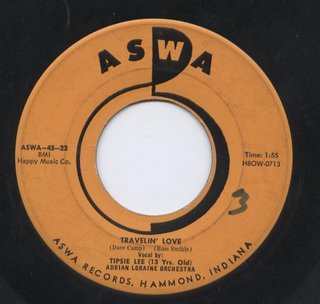I'm not sure in which order these things happened, but Driftwood's life got much more interesting when one of his songs attracted enough to lead to a contract with RCA records and result in a cover version of that song by an up-and-coming country singer named Johnny Horton. That song, The Battle of New Orleans, went on to become one of the biggest hits of the late 1950's, hitting number one for six weeks in 1959.
As much as I love that record (and all of Horton's tragically few hits), Jimmie Driftwood's records are great on another scale entirely. Accompanying himself with the distinctive sound of his homemade guitar (along with a few other instruments), and his equally distinctive voice, Driftwood sang with an honesty and directness I'd love to hear on records these days.
Today, I've uploaded two of my favorite examples from his many albums (at least seven that I know of, released from 1959-66 or so). The first "Rattlesnake Song" tells a familiar folk tale, of the lover saving her beloved from a deadly bite by sucking out the poison.
However, in this case, the song is rendered unique by the strange lyrical additions he makes to each verse, throwing in not only the fairly standard nonsense chorus, but throwing rhyming nonsense syllables into the middle of every few words.
The other song, Fidi Diddle Um A-Dazey, is easily my favorite Driftwood recording. In less than two minutes (including the time it takes to repeatedly sing the nonsense chorus)he tells the highlights (or lowlights, if you will) of a family's life.
And what a story: a randy wife stays eternally pregnant, having 16 children in 12 years, until her constant desires literally kill her husband, at which point she marries a hugely fat man. He, in turn, snores so heavily that the house collapses on all of them, killing the woman and her new man, but sparing the children, who discover enough money (a million dollars!) in the fat man's pockets to sustain them.
And it's catchy as hell, fun to sing along to, and one of these days, when I can master that guitar lick while singing, I'm going to sing it live.
When he was in his late '80's (in the mid 1990's), it was written that Jimmie Driftwood would still welcome anyone who showed up at his home in Arkansas and visit with them in his home. He died at age 91 in 1998. I wish I'd known of his hospitality a few years earlier, because I'd have love to have met him.
Download: Jimmy Driftwood - Rattlesnake Song
Play:
Play:


